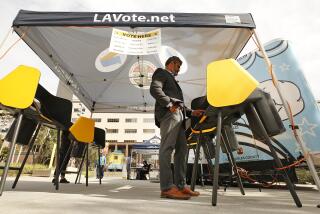Tax Board Member Changes Mind on Reform
- Share via
SACRAMENTO — Conway Collis, who has amassed more campaign funds than any other member elected to the Board of Equalization, began promoting legislation Friday that would prohibit board members from participating in decisions affecting political contributors.
Collis, a Democrat and an opponent of similar legislation in the past, said he decided to push for restrictions on campaign financing after it became apparent that public confidence in the tax board had been shaken by an FBI investigation of one member and another member’s accusations that campaign contributions were influencing decisions. Collis’ own records were subpoenaed in December as part of that probe.
The public attention on campaign contributions, he said, had become so intense that the issue was overshadowing his attempts to reform board procedures, making it easier for taxpayers to lodge appeals, and was giving impetus to other legislation that would eliminate the elected board.
The normally obscure board administers and enforces business taxes. It is made up of four members elected by districts, and the state controller, who is an ex officio voting member.
“I think that in fact elected officials that I have seen are able to make sound substantive decisions regardless of whether or not they have received a campaign contributions, but the campaign contribution creates an appearance of favoritism that undermines public confidence in the decisions,” Collis said in an interview. “For that reason I think it’s important to eliminate those contributions.”
His proposal, to be introduced next week by Assemblyman Elihu Harris (D-Oakland), would prohibit members from voting on matters affecting those who had contributed to their campaigns in the previous 12 months. It would also prohibit Board of Equalization members from accepting contributions from any person or business that they had reason to believe would have a case before them within the next year.
“This provision would have the effect of outlawing any contributions from utilities and railroads,” Collis said.
The proposal, however, drew whoops of laughter from board member William Bennett, who refuses to accept campaign contributions, and state Sen. Quentin Kopp, (I-San Francisco), who tried unsuccessfully to pass similar legislation last year.
“He (Collis) must have invented the word hypocrite,” Kopp said. “He was the only board member who testified against my bill last year--how it was unfair, how no such similar rules applied to judges. I remember his testimony.”
Kopp has since proposed legislation that would eliminate the board and create a California tax court to hear appeals by individuals and corporate taxpayers.
Added Bennett: “How startling and delightful. There’s no sinner without redemption. Now I assume he’s going to make substantial refunds to the oil companies, the public utilities and the banks which have contributed to him so generously.”
It was Bennett who bitterly complained that campaign contributions were influencing board decisions, particularly in cases involving utility companies. Collis said he stopped voting two years ago on matters affecting his contributors to avoid conflicts of interest.
The FBI’s investigation has also focused on the tax breaks granted by the board’s majority to corporations that had given campaign donations to some board members.
Although federal investigators collected documents from his office in the course of that probe, Collis said he has since been assured by the U.S. attorney’s office that he is not a target of the investigation. U.S. Atty. David Levi declined to confirm or deny the statement.
More to Read
Get the L.A. Times Politics newsletter
Deeply reported insights into legislation, politics and policy from Sacramento, Washington and beyond. In your inbox three times per week.
You may occasionally receive promotional content from the Los Angeles Times.










